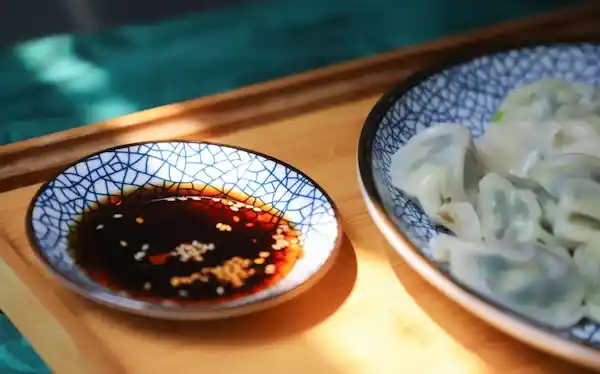Soy sauce, made from fermented soybeans, salt, and yeast, has been eaten in China since around 200 BC. It’s typically used as a dipping sauce or to add flavor to dishes. But can you eat soy sauce raw without cooking it? The answer is yes, but only in small quantities. The heat from the food that it accompanies will kill any bacteria that may be present in the sauce. Read on to find out more about raw soy sauce.
How to eat raw Soy Sauce?
The fermentation process breaks down the complex carbohydrates into simple sugars, which gives soy sauce its unique flavor.
Although soy sauce is traditionally used as a dipping sauce or adds flavor to cooked dishes, you can also eat it raw. Just like with honey, some people find that eating it raw provides certain health benefits.
However, if you want to try this out yourself, read up on some possible risks before doing so. For example, most types of soy sauce contain small amounts of alcohol (usually less than 0.5% ABV).
Effects of eating soy sauce raw
If you’re considering eating soy sauce raw, you should know a few things first.
- Soy sauce is made from fermented soybeans, which contain live bacteria.
- These bacteria can cause food poisoning if the sauce isn’t cooked.
- Additionally, soy sauce is high in sodium, and eating it raw could increase your risk of high blood pressure.
- However, some brands of soy sauce are safe to eat raw because they’ve been pasteurized. If unsure, check the label before consuming any raw soy sauce.
Does soy sauce need to be cooked?
Have you ever wondered why people cook soy sauce? After all, soy sauce is already a fermented food. So, what’s the point of cooking it?
Because soy sauce is made from fermented soybeans, it contains live bacteria that can cause food poisoning if the sauce is not cooked. Additionally, raw soy sauce may contain harmful toxins that are destroyed during cooking.
For these reasons, it is generally safest to consume soy sauce that has been heated. In addition, since there’s no cooking involved in this dish, foodborne illnesses could be a risk factor for anyone who consumes raw soy sauce for an extended period.
Will boiling Soy Sauce Spoil It?
If you think about what happens to the color of any food when it boils, you might know what will happen to your soy sauce. It will turn an unappetizing brown color with a strong metallic taste. So if you are looking for that classic, clear amber color with a salty and sweet taste, boiling your soy sauce will not ruin it.
Health Benefits
- Soy sauce is a good source of protein and contains all the essential amino acids your body needs.
- It’s also low in calories and fat, making it a great condiment for those watching their weight.
- Soy sauce is rich in antioxidants, which can help protect your cells from damage and may even reduce the risk of some chronic diseases.
- The fermentation process that soy sauce undergoes also creates beneficial probiotic bacteria, promoting a healthy gut microbiome.
In which food items can we use raw Soy Sauce?
Rice
Rice and soy sauce are one of the most popular combinations in Japan. Soy sauce is a common ingredient in many other dishes, such as sukiyaki. Rice and soy sauce can also be mixed before cooking.
Chicken
Chicken and soy sauce is another Japanese favorite that pairs well with raw soy sauce. Stir-fried veggies can be seasoned with soy sauce while uncooked, bringing out their natural flavors and adding umami to the dish.
Sushi
When eating sushi, raw soy sauce is always served alongside ginger for dipping. Sushi chefs usually don’t add more than a few drops of it on each piece because its salty flavor can overpower the delicate seafood inside if used too liberally.
Noodles
Noodles and soy sauce are common in Thailand, where noodles often accompany grilled pork, beef, or chicken skewers. In Korea, soy sauce is added to kimchi (spicy pickled cabbage) and tofu stews called jjigae. Soy sauce can be added directly to meat before cooking it to enhance the flavors of both ingredients.
Ramen
Ramen and soy sauce are very popular in Japan as well. The saltiness of the soy sauce balances nicely with the broth’s richness and fresh ramen noodles’ texture.
It’s recommended to cook the soy sauce before adding it to dishes like soup or pasta. If you’re making stir-fry dishes with meat, you can use raw soy sauce without worrying about changing your dish’s flavor. It’s also important not to forget fried eggs when considering foods that work best with raw soy sauce!
Conclusion
Soy sauce is a fermented product, meaning that the bacteria in the sauce already have a chance to do their work. That being said, it’s perfectly safe to eat soy sauce raw. Many people believe that the fermentation process gives soy sauce its unique flavor. So go ahead and enjoy your soy sauce straight from the bottle!
I am Anand, and I am a business owner and consultant in my day job. I have spent years studying what’s inside the products we buy. ‘Feedrer’ is a wordplay on you-know-who and talks about all things food.
